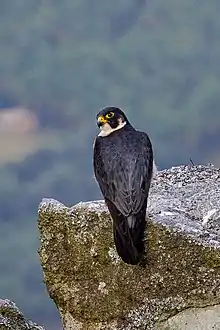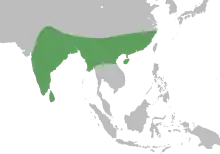| Shaheen falcon | |
|---|---|
 | |
| Scientific classification | |
| Domain: | Eukaryota |
| Kingdom: | Animalia |
| Phylum: | Chordata |
| Class: | Aves |
| Order: | Falconiformes |
| Family: | Falconidae |
| Genus: | Falco |
| Species: | |
| Subspecies: | F. p. peregrinator |
| Trinomial name | |
| Falco peregrinus peregrinator | |
 | |
| Distribution limits based on Döttlinger (2002) | |
| Synonyms | |
| |
.jpg.webp)
The shaheen falcon (Falco peregrinus peregrinator) is a non-migratory subspecies of the peregrine falcon found mainly in Pakistan[2] It has also been described as a migratory subspecies.[3] Other common names for the subspecies include the black shaheen[4] and Indian peregrine falcon. The word shaheen in these names may also be spelled as shahin.[5] This species was termed as the black shaheen by falconers to separate it from the true shaheen of Persian literature. Scholars of Persian and the Russian ornithologist Georgi Petrovich Dementiev have noted that the name shaheen in Persian literature actually referred to Falco peregrinus babylonicus.[6][7]
Etymology
Shaheen and other variations come from Middle Persian šāhēn (literally "majestic, kingly") and the given name Šāhēn. Compare Middle Armenian շահէն (šahēn) and Old Armenian Շահէն (Šahēn). It has two meanings in Persian/Farsi: falcon, especially the Barbary falcon. The second meaning is a pointer of a scale.[8][4]
Taxonomy
The taxon was formally described by Carl Jakob Sundevall in 1837 as a separate species, Falco peregrinator, based on a juvenile specimen caught on a ship between Sri Lanka and the Nicobar Islands.[9][10] Its taxonomic status as a subspecies of Falco peregrinus has been controversial for several years.[9][11] Amidst conflicting views by ornithologists in the mid-19th century, the shaheen falcon was described as three new species: Falco shaheen from south India was described by Jerdon in 1839, Falco micrurus from Nepal and Burma was described by Hodgson in 1844, and Falco atriceps from Northern India was described by Hume in 1869. These three species were generally accepted as distinct until around the turn of the century, when all three were lumped together with Sundevall's Falco peregrinator as Falco peregrinus peregrinator.[9][12]
The subspecies name peregrinator, Latin for a wanderer or habitual traveler, reflects its traveling ability.[9][13]
The common English name shahin should not be confused with the same word in the Indo-European language, Persian,[14][15][16] the Turkic language Turkish,[17] and the Afroasiatic language Arabic,[18] where it may refer to falcons or a species of falcon. In the Indo-European language Hindi, shahin or shahin kohi (koh refers to a hill[7]) refer to the female of the peregrinator subspecies, while males of the subspecies are referred to as kohila.[5][19]
Description
The shaheen is a small and powerful-looking falcon with blackish upperparts, rufous underparts with fine, dark streaks, and white on the throat. The complete black face mask is sharply demarcated from the white throat. It has distinctive rufous underwing-coverts. It differs in all these features from the paler F. p. calidus, which is a scarce winter migrant to Sri Lanka.[20] Males and females have similar markings and plumage; apart from size there is no sexual dimorphism.[21] The birds range in length from 380 to 440 mm.[20] The male is about the size of a house crow (Corvus splendens); the female is larger.[21]
Distribution and habitat
The shaheen is found in South Asia from Pakistan across to India[3] and Bangladesh in the east and to Sri Lanka,[3] central and south-eastern China,[3] and northern Myanmar.[3] In India, it has been recorded in all states mainly from rocky and hilly regions. The shaheen has also been reported from the Andaman and Nicobar Islands in the Bay of Bengal.[22]
Sri Lanka
The shaheen is the local resident species of the peregrine in Sri Lanka[20] where it is uncommon but found throughout the island in the lowlands, and at elevations of up to 1200 m in the hill country,[21] frequenting mountain cliffs and rock outcrops. The sheer cliff faces provide it with nest sites and serve as vantage points from which it can launch aerial strikes against fast-flying birds such as swifts.[23] Sigiriya is a well known site for it.[20]
Ecology and behaviour
The shaheen is usually seen as a solitary bird, or in pairs on cliffs and rock pinnacles. Peregrines typically mate for life.[21] Because of the size difference between a male and a female, a mated pair generally hunt different prey species. It is adapted to taking prey in the air and can achieve a speed of 240 kmh in level flight; when diving after prey it can exceed speeds of 320 kmh (200 mph).[24]
Feeding
Shaheens mostly hunt small birds, though medium-sized birds such as pigeons and parrots are also taken.[21] Strong and fast, they dive from great heights to strike prey with their talons. If the impact does not kill the prey, the falcon bites the neck of its victim to ensure a kill.
Breeding
The reproductive season is from December to April. The birds occupy nests on high cliff ledges or in cavities and tunnels.[21] They lay clutches of 3-4 eggs. The chicks fledge within 48 days with an average nesting success of 1.32 chicks per nest.[22] In India the shaheen has been recorded as nesting on man-made structures such as buildings and mobile phone transmission towers.[22]
Status
The conservation status of the shaheen in Sri Lanka is vulnerable.[20] A preliminary population estimate of 40 breeding pairs there was made in 1996, based on a brief survey.[25] The estimate was later corrected to 100 breeding pairs.[9]
In culture
In Pakistani literature, the shaheen has a special association with the poetry of the country's national poet, Allama Iqbal.[26] It also appears on the official seal of the Pakistan Air Force logo, and is used as a nickname for the Pakistani cricket team and for it's player Shaheen Shah Afridi.[27]
A misprinted 1992 Indian stamp in a "birds of prey" series showed a picture of an osprey, with the incorrect denomination and the name Shahin Kohila, the Hindi name for female shaheen falcons; one of these stamps sold for £11,500 in a 2011 London auction.[5][28]
References
- ↑ "ITIS Standard Report Page: Falco peregrinus peregrinator". Integrated Taxonomic Information System. Retrieved 2014-04-18.
- ↑ Döttlinger, Hermann; Nicholls, Mike (2005). "Distribution and population trends of the 'black shaheen' Peregrine Falcon Falco peregrinus peregrinator and the eastern Peregrine Falcon F. p. calidus in Sri Lanka" (PDF). Forktail. 21: 133–138.
- 1 2 3 4 5 Molard, Laurent; Kéry, Marc; White, Clayton M. (2007). "Estimating the resident population size of Peregrine Falcon Falco peregrinus in Peninsular Malaysia" (PDF). Forktail. 23: 87–91. Describes subspecies peregrinator "from the southern Indian subcontinent and Sri Lanka", says "current range...is defined as extending eastward into northern Myanmar and central and south-eastern China", and possibly as vagrants in Malaysia, but that their taxonomic status in some regions is uncertain.
- 1 2 Various meanigns of Shahin, (archive)
- 1 2 3 Pakistan Journal of Science. Vol. 17–18. Pakistan Association for the Advancement of Science. 1965. p. 157.
142. The Shahin Falcon. Falco peregrinus peregrinator Sund (F. No. 1719. Vernacular names: Shahin Kohi (female), Kohila (male), (Hind). Abundance: Winter visitor. Food: Pigeons, parrots, bats, quails, partridges, duck.
- ↑ Dementiev, G.P. (1957). "On the shaheen Falco peregrinus babylonicus". Ibis. 99 (3): 477–482. doi:10.1111/j.1474-919X.1957.tb01961.x.
- 1 2 Phillott, D. C. (1907). "Note on the Shahin Falcons (Falco peregrinator and F. barbarus, Blanford)". Journal of the Asiatic Society of Bengal. 3: 389–393.
- ↑ Wiktionairy - Shaheen
- 1 2 3 4 5 Döttlinger, Hermann (2002). The Black Shaheen Falcon (Falco peregrinus peregrinator Sundevall 1837): Its Morphology, Geographic Variation and the History and Ecology of the Sri Lanka (Ceylon) Population. University of Kent. pp. 1, 3–4, 119. ISBN 978-3-8311-3626-1.
- ↑ "Avibase the world bird database".
- ↑ Rodríguez, Beneharo; Siverio, Felipe; Siverio, Manuel; Rodríguez, Airam (2011). "Variable plumage coloration of breeding Barbary Falcons Falco (peregrinus) pelegrinoides in the Canary Islands: do other Peregrine Falcon subspecies also occur in the archipelago?" (PDF). Bulletin of the British Ornithologists' Club. 131 (3): 140–156.
- ↑ Hartert, Ernst (1912–1921). Die Vögel der paläarktischen Fauna: Systematische Übersicht der in Europa, Nord-Asien und der Mittelmeerregion vorkommenden Vögel (in German). Vol. Band 2. Berlin: Verlag von R. Friedländer & Sohn. p. 1051.
- ↑ Lewis, Charlton Thomas (1918). An Elementary Latin Dictionary. American Book Company. p. 597.
- ↑ Sen, Ramdhun (1841). Madhub Chunder Sen (ed.). A Dictionary in Persian and English, with Pronunciation of Persian Words in the Roman character (2nd ed.). Calcutta. p. 111.
شاهين, sháhín, a species of falcon.
- ↑ "The Sikandar Nama,e Bara". Persian Literature in Translation. The Packard Humanities Institute (PHI). Retrieved 2014-04-21.
'Sháhín' signifies—a royal white falcon (bahrí); the beam of a pair of scales; and one of the two stars of the constellation of the eagle.
- ↑ Awde, Nicholas; Shahribaf, Camilla (2006). Farsi: Farsi-English, English-Farsi Dictionary & Phrasebook. Hippocrene Books. p. 52. ISBN 978-0-7818-1073-9.
shâhin falcon
- ↑ Redhouse, James William; Wells, Charles (1880). An English and Turkish dictionary. [Entitled] Redhouse's Turkish dictionary in Two Parts, English and Turkish, and Turkish and English (2nd ed.). London: Bernard Quaritch. p. 610.
شاهين, shāhin, s. t., A royal falcon.
- ↑ Catafago, Joseph (1858). An English and Arabic Dictionary, in Two Parts, Arabic and English, and English and Arabic. London: Bernard Quaritch. p. 514.
- ↑ History of the Berwickshire Naturalists' Club, Instituted September 22, 1831. Vol. 6: 1869-1872. Alnwick: The Berwickshire Naturilists' Club. 1872. p. 324.
In the East, male and female species have different names... In like manner, we have the shahin and the kohila...
- 1 2 3 4 5 de Silva Wijeratne, Gehan; Warakagoda, Deepal; de Zylva, T.S.U. (2007). "Species description". A Photographic Guide to Birds of Sri Lanka. New Holland Publishers (UK) Ltd. p. 37. ISBN 978-1-85974-511-3.
- 1 2 3 4 5 6 Manjula Vijesundara (2007). Sinhala Kurulu Vishvakoshaya (Sinhala Bird Encyclopaedia) - Part 1. Suriya Publishers. p. 278. ISBN 978-955-8892-94-7.
- 1 2 3 Pande, Satish; Yosef, Reuven; Mahabal, Anil (2009), "Distribution of the Peregrine Falcon (Falco peregrinus babylonicus, F. p. calidus and F. p. peregrinator) in India with some notes on the nesting habits of the Shaheen Falcon", in Sielicki, Janusz (ed.), Peregrine Falcon populations – Status and Perspectives in the 21st Century, Mizera, Tadeusz, European Peregrine Falcon Working Group and Society for the Protection of Wild animals "Falcon", Poland and Turl Publishing & Poznan University of Life Sciences Press, Warsaw-Poznan, pp. 493–520, ISBN 978-83-920969-6-2
- ↑ de Silva Wijeyeratne, G (June–July 2006). "The Shaheen Falcon—Sri Lanka through a Lens". Synergy. 3 (2): 53. ISSN 1391-9385.
- ↑ U.S. Fish and Wildlife Service (1999), All about the Peregrine falcon, archived from the original on 2008-04-16, retrieved 2007-08-13
- ↑ Döttlinger,Hermann; Hoffmann,Thilo W (1999), "Status of the Black Shaheen or Indian Peregrine Falcon Falco peregrinus peregrinator in Sri Lanka", J. Bombay Nat. Hist. Soc., 96 (2): 239–243
- ↑ "National Symbols of Pakistan". Government of Pakistan. Archived from the original on 2013-08-27. Retrieved 2013-08-23.
- ↑ A. Rashid Shaikh (2000). The Story of the Pakistan Air Force, 1988-1998: A Battle Against Odds. Shaheen Foundation. ISBN 978-969-8553-00-5.
- ↑ Moneylife Digital Team (2011-06-27). "Indian stamps fetch handsome prices at London auction". Moneylife. Retrieved 2014-04-21.
Further reading
- Döttlinger, Hermann. (2002). The Black Shaheen Falcon (Falco Peregrinus Peregrinator Sundevall 1837), its Morphology, Geographic Variation and the History and Ecology of the Sri Lanka (Ceylon) Population. ISBN 3-8311-3626-2